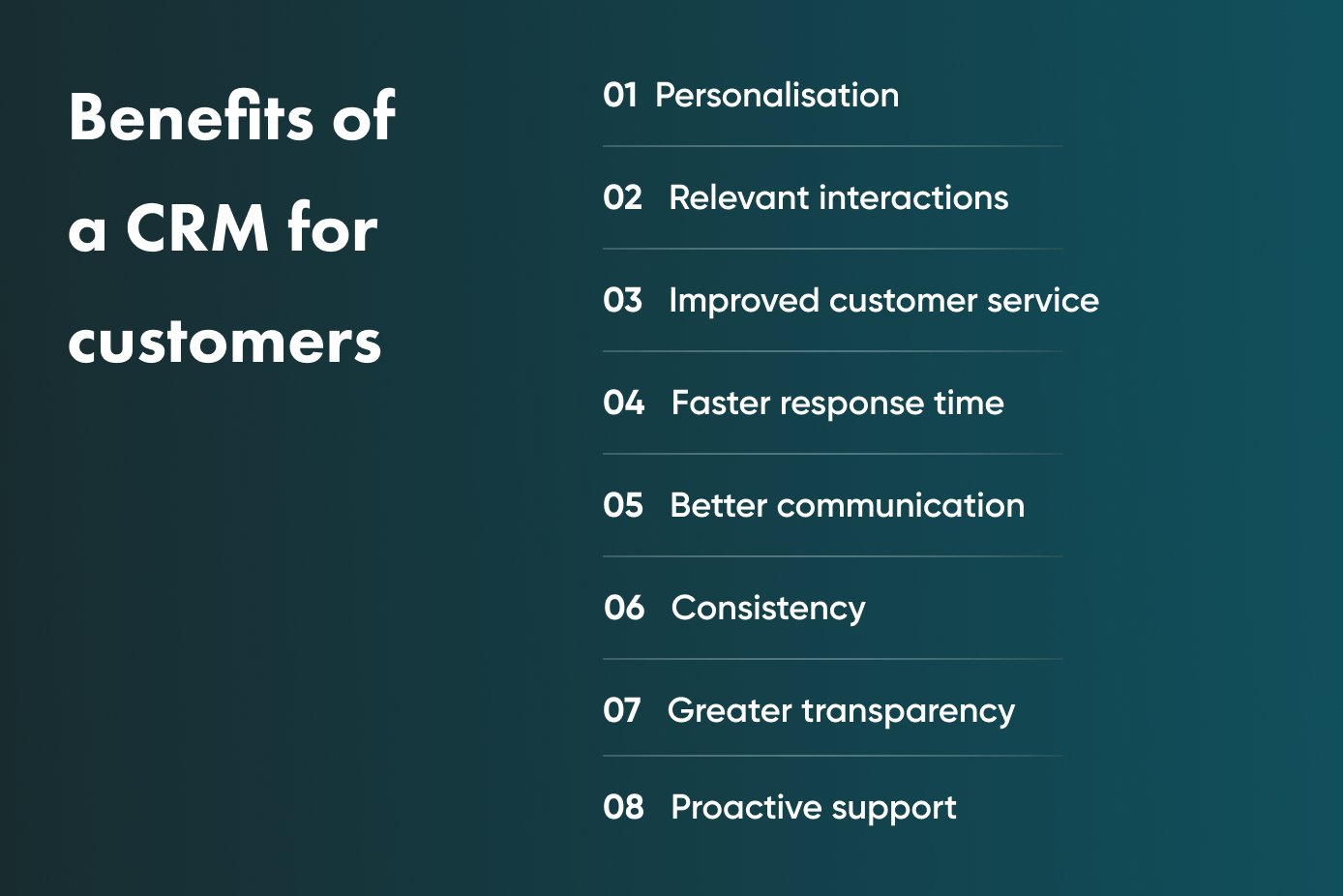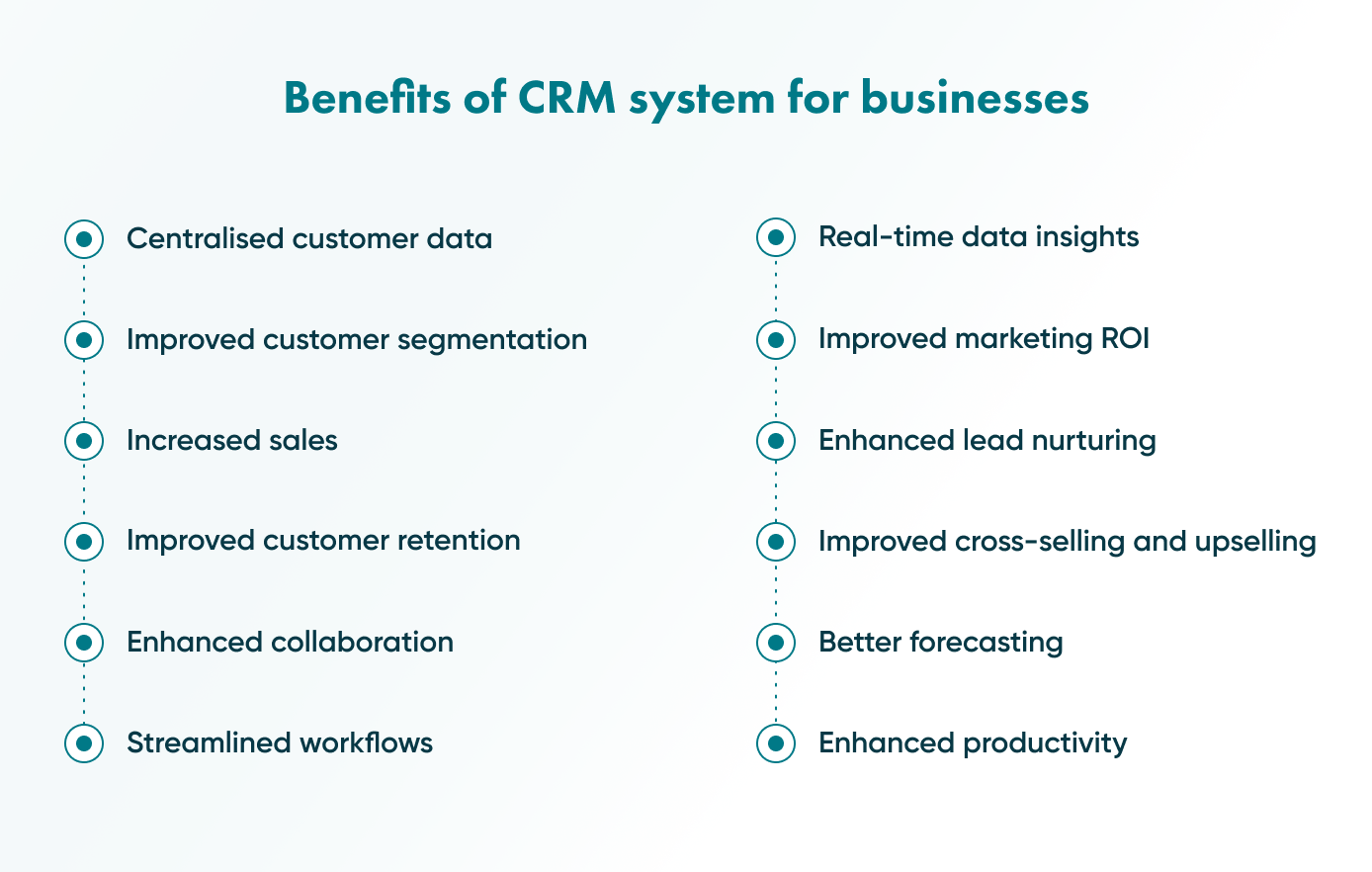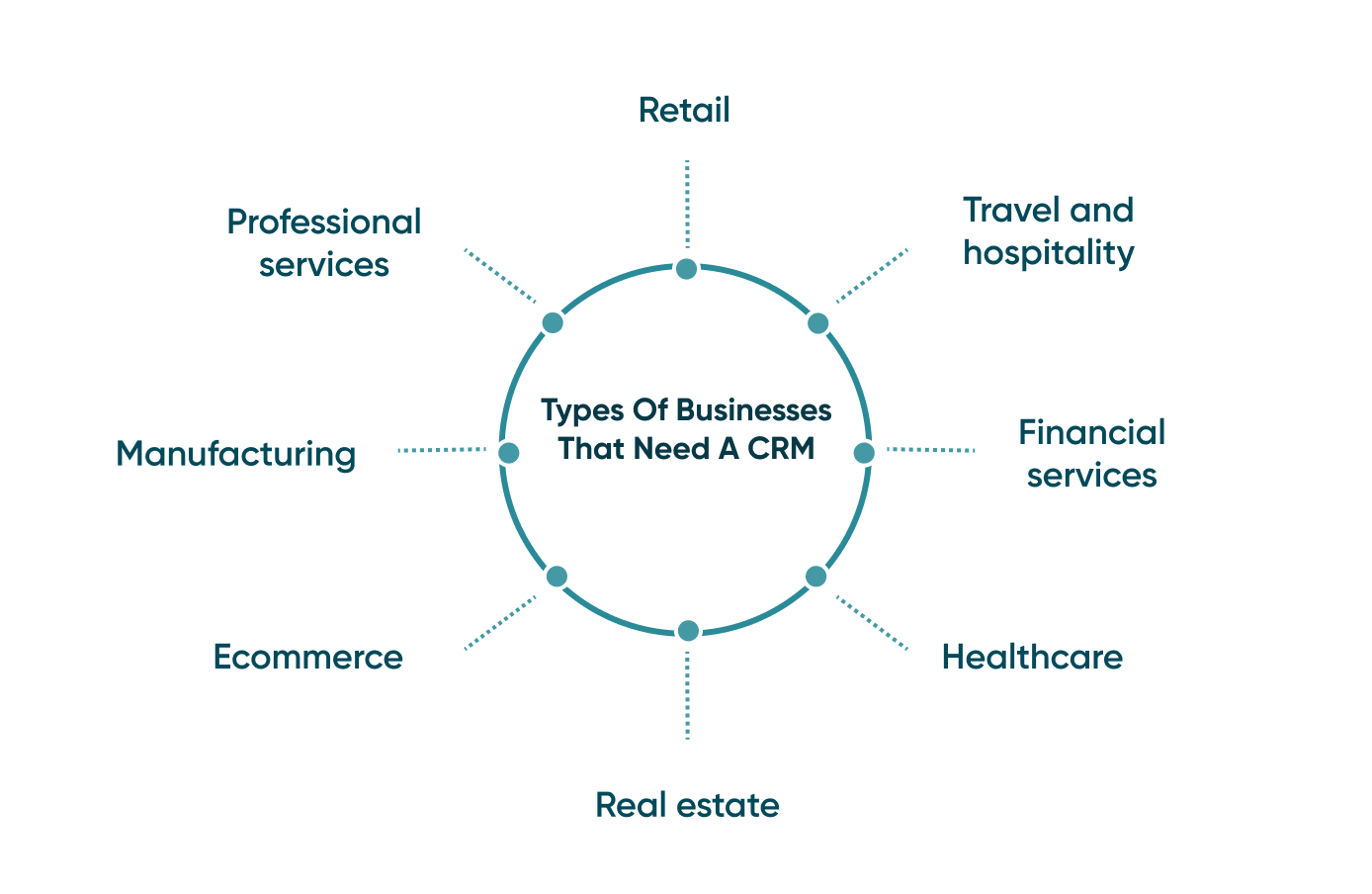The Benefits of CRM Systems for Your Business


In the fast-paced world of business, companies that can connect with their customers on a personal level and create long-lasting relationships are the ones that thrive.
This is where a customer relationship management (CRM) system comes in, providing businesses with the tools and insights necessary to cultivate meaningful connections with their customers. A CRM system can significantly impact a company's success, from improving communication and customer service to streamlining sales and marketing efforts.
Today we will delve into the key CRM advantages (and some disadvantages), exploring how CRM software can help businesses improve customer satisfaction, increase revenue, and gain a competitive advantage.
Whether you're a startup or an established enterprise, understanding the advantages of a CRM system is essential to staying ahead in today's marketplace. So let's explore the many ways a CRM system can benefit your business and why it is also crucial for customers.
Benefits of a CRM for customers
It is worth mentioning that CRM systems have many advantages not only for businesses but also customers. That is why we’ve broken this section into two parts, listing CRM benefits for both parties.

Personalisation
With CRMs, businesses can provide personalised experiences to customers by storing their data and preferences. This leads to better engagement and higher satisfaction.
Personalisation can help businesses understand their customers' preferences, behaviours, and needs, allowing them to deliver targeted and relevant communications. Companies can increase customer engagement and build stronger relationships by providing tailored recommendations, offers, and content.
Relevant interactions
A CRM system allows businesses to engage with customers promptly and relevantly based on their past interactions and preferences. This benefit of CRM means that customers appreciate timely and convenient interactions. Companies can make it easier for customers to get the information they need and resolve any issues they may have.
Timely interactions can also help businesses resolve customer issues more quickly and effectively. This can reduce the likelihood of negative reviews or complaints and improve overall customer satisfaction.
Improved customer service
CRM software enables businesses to track customer issues and complaints and respond promptly and effectively. This leads to improved customer satisfaction and loyalty. In addition, companies can quickly access data and respond to customer inquiries on time by providing a centralised location for customer information.
Overall, investing in a CRM system can positively impact customer service and ultimately lead to increased revenue and business growth.
Faster response time
Specialists can quickly respond to customer queries and concerns using CRM systems to improve their overall experience. A faster response can reduce customer wait times, leading to a better customer experience and positive reviews. Moreover, a business responding promptly to customer inquiries and requests can improve its reputation.
Better communication
An undeniable benefit of CRM systems is that they lead to more effective communication. Businesses can communicate with customers across multiple channels, such as email, social media, and SMS.
Consistency
A CRM system makes it possible for businesses to maintain a consistent approach to customer interactions, regardless of the channel or touchpoint. Consistency helps to build trust between businesses and their customers.
When companies consistently provide high-quality products, services, and support, customers are more likely to trust the business and continue to do business with them.
Greater transparency
One of the leading CRM advantages is that customers can view their past interactions and transactions with a business, increasing transparency and trust. Transparency enables businesses to be more responsive to customer needs and concerns. With a piece of transparent and honest information, companies can help customers understand what to expect and avoid misunderstandings or surprises that could harm their satisfaction.
Proactive support
CRM software enables businesses to proactively identify and address customer issues and concerns, reducing the likelihood of customer churn.
When customers have a problem or a question, they want it resolved as quickly as possible. Businesses can promptly address customer issues by providing customer support, preventing them from becoming more significant problems.
CRM advantages from a company's perspective
Now, let’s get into some benefits of CRM systems for business owners.

Centralised customer data
Using a CRM, businesses can store all customer data in one centralised location, making it easy to access, manage, and analyse. CRM software excels in maintaining a centralised database that contains comprehensive information about customers, easily accessible to anyone in the company who requires it.
For instance, sales representatives can quickly view a customer's preferred products. In addition, the CRM system records all previous interactions between the customer and the company, which can guide future marketing and sales strategies. This saves time that employees would otherwise spend searching through old files and improves the overall customer experience, making it more efficient and productive.
Improved customer segmentation
As another plus, businesses can segment their customers based on various criteria, such as demographics, behaviours, and preferences. This helps in personalising marketing campaigns and improving customer engagement.
Managing a long list of hundreds of contacts can take a lot of time and effort. For instance, it can be challenging to determine which customers are interested in receiving emails regarding new in-store products. However, with a CRM system, contact lists are automatically segmented based on specific criteria, making it easier to find and contact the desired audience.
Increased sales
CRM system benefits also include increased sales. A CRM system helps sales teams to manage leads and opportunities, track sales pipelines, and forecast revenue. This leads to more effective sales processes and higher closing rates.
A CRM tool can optimise your sales process by creating a sales pipeline, automating essential tasks, and consolidating all sales data in one, centralised location. It can boost productivity and increase sales.
Improved customer retention
Specialists can proactively engage with customers, identify and resolve issues, and provide value-added services using a reliable CRM system. This results in improved customer loyalty and retention.
Enhanced collaboration
An effective CRM system offers advantages beyond customer relationship management by fostering collaboration within your organisation. It does so by improving communication among team members.
With cloud-based CRMs, all employees can access communication and interactions between the company and customers. This transparency facilitates a shared understanding of how to represent the company to potential leads.
Streamlined workflows
A CRM system automates routine tasks and workflows, such as data entry, follow-up emails, and appointment scheduling. It helps businesses save time and increase productivity.
Real-time data insights
CRM benefits businesses, and here’s further proof: A CRM system provides real-time insights into customer behaviour and preferences, allowing companies to make data-driven decisions and optimise their strategies.
Improved marketing ROI
Your business can measure marketing campaigns' effectiveness and adjust its strategy accordingly using a CRM system. As a result, it will contribute to the improved ROI and better campaign outcomes.
Enhanced lead nurturing
Lead nurturing is a complex and demanding process that involves multiple steps and various communication opportunities. A CRM tool simplifies this process by automatically managing it, prompting employees to contact prospects appropriately and tracking every interaction, including emails and phone calls.
A CRM system enables businesses to track and nurture leads throughout the sales cycle, from initial contact to conversion. This leads to more effective lead generation and higher conversion rates.
Improved cross-selling and upselling
CRM systems can significantly enhance cross-selling and upselling efforts for businesses. By analysing customer data and behaviour, businesses can identify opportunities to offer additional products or services that complement or enhance the ones customers have already purchased.
Reduced customer churn
As mentioned above, businesses can collect and analyse customer data with CRM systems, including purchase history, feedback, and communication preferences. This data can be utilised to customise the customer experience and provide individualised solutions to their concerns. By promptly and effectively addressing customer issues, businesses can lower the probability of attrition.
Better forecasting
This data gathered about customer behaviour can also be used to forecast future customer behaviour and help businesses make data-driven decisions with the assistance of a CRM system. For instance, if a company can predict a surge in demand for a particular product or service, it can adjust its inventory or marketing efforts accordingly.
Enhanced productivity
The marketing automation technology in CRM software can accelerate tedious tasks such as drip campaigns, allowing employees to concentrate on tasks that require human input, such as content creation.
CRM software also guarantees that critical tasks do not go unnoticed, for example, by ensuring that important emails are always directed to the appropriate individuals. Furthermore, CRM software can provide a dashboard that displays how your business processes function, highlighting areas where workflows could be enhanced.
Want to streamline your customer management process? Then contact us to discuss how our custom CRM development services can benefit your business today!
Which businesses need CRM systems
When starting a new business, you might wonder: could this use a CRM, too? Let’s look into the types of businesses where CRM software proves helpful.

Retail
CRM systems can help retailers manage customer interactions, track purchasing patterns, and personalise marketing campaigns.
Travel and hospitality
CRMs can be helpful for hotels, resorts, and tour operators to manage customer relationships, improve guest satisfaction, and increase repeat business. It is worth noting that the benefits of CRM are equally valuable for businesses both small and large.
Financial services
CRMs are necessary for banks, insurance companies, and investment firms to track financial data and streamline customer communication.
Healthcare
Hospitals, clinics, and medical practices can handle patient interactions, improve patient outcomes, and streamline administrative tasks using CRM systems.
Real estate
Along with other CRM benefits for business, real estate agents and brokerages can manage leads, track sales activities, and automate marketing campaigns.
Ecommerce
Online retailers can benefit from CRM software to work with customer data, track buying behaviour, and personalise marketing efforts.
Manufacturing
CRM systems are valuable for manufacturers to improve customer relationships, track sales activities, and increase supply chain efficiency.
Professional services
In addition, CRM systems can help law firms, consulting firms, and other professional service providers track billing and time spent on projects as well as improve collaboration.
An off-the-shelf CRM system or a custom solution?
Deciding between an off-the-shelf or custom CRM system can be challenging for businesses. Both options have advantages and disadvantages, and the choice ultimately depends on the specific needs and goals of the company.
Off-the-shelf solutions have limited flexibility to customise features and workflows to match the business's specific needs. They may also not integrate with existing systems and may require additional customisation or integration.
A custom-built CRM system, on the other hand, is tailored to the specific needs of your business. It can be designed to meet your unique requirements and workflows, providing a more personalised and effective solution than an off-the-shelf option.
The system can grow and adapt as your business evolves. In addition, it can be updated and expanded to accommodate new features and capabilities as needed, ensuring that it remains relevant and valuable over time.
With a custom CRM system, you have greater control over the system's features, capabilities, and functionality. You can prioritise the most critical features of your business and make changes or updates as needed to ensure that the system meets your evolving needs.
A few challenges of CRM systems
Besides the advantages of customer relationship management software, it still has some challenges you should know about.
Costs
Implementing and maintaining a CRM system can be expensive, particularly for small businesses. Upfront fees may be associated with purchasing the software, not to mention ongoing costs for training, support, and maintenance costs.
Privacy concerns
CRM systems typically store sensitive customer data, such as personal and financial information. If this data is not adequately secured, it could be vulnerable to data breaches, cyberattacks, or other security threats.
Integration issues
Integrating a CRM system with other business tools and systems can be challenging, especially if the system is incompatible with existing software or processes.
Dependence on technology
CRM systems rely on technology to function. If there are technical issues or system failures, this could disrupt business operations and cause delays or other problems.
What comes next
We have reached the conclusion that CRM systems are definitely valuable for most business types and that CRM systems benefit customers and businesses alike. However, you must remember that developing custom CRM software is preferable if you want a solution that’s best suited to your business.
A software development company like Go Wombat can create your CRM considering all your requirements. We choose the appropriate technologies and do our best to ensure your future CRM system performs to your delight.
Ready to improve your business efficiency? Let our experienced developers at Go Wombat build a CRM system that works for you. Contact us now!
Unlock Success with Premium Software Development
Contact us


FAQ
Who uses CRMs?
Various businesses may use CRM systems, such as real estate companies, healthcare organisations, hospitality, retail, financial services, and manufacturing. In fact, all companies that want to improve their business should use a CRM.
How does a CRM help sales?
A CRM helps sales teams automate and streamline their sales processes, from lead generation to closing deals. It saves time and helps sales reps focus on building relationships with their prospects and customers. A CRM allows sales teams to track and manage leads efficiently, ensuring they promptly follow up with each lead. Sales reps can then prioritise their efforts and focus on the most promising leads.
How does a CRM affect business?
A CRM enables companies to manage their customer data effectively, providing insights into customer preferences, purchase history, and previous communications. Businesses can personalise their marketing and sales efforts, leading to stronger customer relationships and increased customer loyalty.
Also, a CRM streamlines and automates business processes, reducing the time and effort required to manage customer data and sales pipelines. Thus, it improves efficiency and productivity, allowing businesses to focus on core operations and growth.
How can we help you ?






